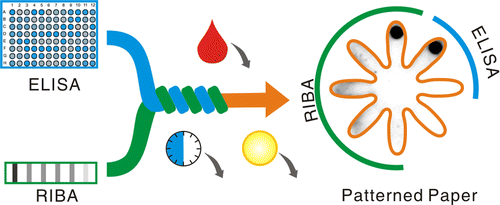Paper-based diagnostics, made with a scrapbooking tool, could curb hepatitis C pandemic

To the relief of patients diagnosed with hepatitis C, the U.S. Food and Drug Administration approved two new treatments late last year, and a few more are on the way. Now scientists are solving another side of the disease's problem: identifying the millions more who have the virus but don't know it—and unwittingly pass it on. A report in the ACS journal Analytical Chemistry describes a novel, scrapbook-inspired test that does just that.
Xuan Mu, Zhi Zheng and colleagues point out that the hepatitis C virus (HCV), a blood-borne pathogen that can cause liver cirrhosis, cancer and even death, kills more people in the U.S. than HIV. It also infects an estimated 150 million people around the world. Although diagnostic tests exist, they require an initial screening and then a costly second test for confirmation. The extra office visits, money and time required for a definitive diagnosis means a lot of people simply can't or won't follow up. To make diagnosis more accessible, the researchers took advantage of the recent development of new, inexpensive paper-based medical technologies and applied it to HCV screening.
Taking a page from the popular scrapbooking pastime, the scientists used a flower-shaped metal paper cutter to punch out shapes from special paper for their diagnostic test. The method solves the problem of patterning the paper, made of nitrocellulose—a highly flammable substance—without using heat. They add antigens, antibodies and other chemicals to the paper to test patient samples. With one flower-shaped paper, they can conduct both HCV tests on a sample simultaneously in just minutes, instead of hours.
More information: "Multiplex Microfluidic Paper-based Immunoassay for the Diagnosis of Hepatitis C Virus Infection" Anal. Chem., Article ASAP. DOI: 10.1021/ac500247f
Abstract
Hepatitis C virus (HCV) infection is a serious and rising global healthcare problem. One critical challenge to tackle this disease is the lack of adequate diagnosis. Here, we develop a multiplex microfluidic paper-based immunoassay, as a novel diagnostic approach, to detect human IgG antibody against HCV (anti-HCV). The paper substrate, highly flammable nitrocellulose (NC), is patterned under ambient temperature by craft punch patterning (CPP) to generate multiple test zones. On the basis of superior merits of patterned paper, this new diagnostic approach demonstrates the key novelty to unprecedentedly combine segmented diagnostic assays into a single multiplex test. The generated diagnostic results are not only informative but can be rapidly and cost-effectively delivered. It would significantly transform the clinical pathway for unwitting individuals with HCV infection. This work highlights the promising role of microfluidic paper-based immunoassays in tackling the diagnostic challenge for the HCV pandemic as well as other diseases.
Journal information: Analytical Chemistry
Provided by American Chemical Society
















